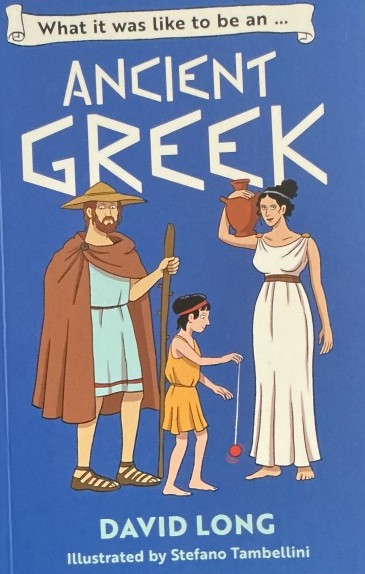Inspiring Young Readers
 posted on 04 Sep 2025
posted on 04 Sep 2025
What it was like to be an ANCIENT GREEK by David Long, illustrated by Stefano Tambellini
In 2023 and earlier this year, I reviewed two previous instalments of David Long’s ‘What it was like to be…’ series which were the Vikings and the Ancient Egyptians. Now we have the fifth in this excellent sequence and, I’m delighted to say, it follows a very similar formula to those other outings.
What I especially like about Long’s introductions to these complex histories is that they are information heavy and largely forego unnecessary gimmicks or the bells and whistles that often come with factual books aimed at younger, more reluctant readers. Long allows the subject to stand for itself and trusts the reader to be fascinated by the clear narrative and excellent illustrations provided by Stefano Tambellini, who is again back on duty for this book.
We start our journey a little over 3,000 years ago with the birth of what we now know as Greece but which started life as Hellas, a collection of city states (Corinth, Sparta, Delphi, Athens) who spent a great deal of time fighting each other. These city states shared many things in common but all of them had the power to set their own laws and to build their communities in the way they felt most comfortable with. Some were monarchies, some warrior dictatorships and, at least one (Athens) a limited form of democracy.
Eventually these warring states were brought together as one country and a great leader – Alexander the Great – emerged to lead this new Greek civilisation into an expanded and much feared empire.
Long then gives us an insight into the everyday life of the Ancient Greek – the nature and quality of which, of course, depended heavily on your social status. Younger readers will be delighted to find an excellent section devoted to the myths, legends and religions that have provided the modern world with a heritage of fantastic stories.
Art, philosophy and sport flourished and Ancient Greece turned out to be a crucible for scientific innovation and, again, there’s plenty here that has filtered down into our modern world – albeit in a modified way.
But being such a fruitful and powerful civilisation comes with its problems – especially if, like Alexander, you overstretch yourself and believe there’s no end to military power. When a new, even more powerful civilisation emerges and challenges your dominance, there’s trouble ahead. That new civilisation was the Romans and:
“By 146 BCE, the Roman army has conquered the whole of the Greek mainland, completely destroying the great city of Corinth and taking its gold and other treasures.”
Although the great power of Ancient Greece was eclipsed, in the final chapter of the book Long makes it clear that we still live with the heritage of their great civilisation:
“The ancient Greeks may have gone, but their best ideas and inventions still fascinate people..”
Available now from Barrington Stoke, you will be able to get a copy from you local independent bookshop – who will be happy to order it for you if they don’t have it on their shelves.
Terry Potter
September 2025